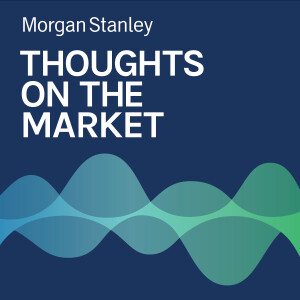
Michael Zezas: What the ‘X-Date’ Means for Investors
 2023-04-05
2023-04-05
With the deadline to raise the debt ceiling looming closer, will recent banking challenges reduce Congress's willingness to take risks with the economy?
----- Transcript -----
Welcome to the Thoughts on the Market. I'm Michael Zezas, Global Head of Fixed Income research for Morgan Stanley. Along with my colleagues, bringing you a variety of perspectives, I'll be talking about the debt ceiling and financial markets. It's Wednesday, April 5th at 9 a.m. in New York.
Markets have focused in recent weeks on key long term debates, such as sizing up the long term effects of Fed policy and bank liquidity challenges. But investors should be aware that there may be at least a temporary interruption for focus on the debt ceiling in the coming weeks. That's because tax receipts will soon start rolling in, which should give the government and markets a clearer assessment of the timing of the x-date, that's the date after which the Treasury no longer has cash on hand to pay all its bills as they come due. Said differently, it's the date that investors would focus on as a potential deadline for raising the debt ceiling in order to avoid a government bond default, or a messy workaround to such a default that could rattle markets.
Some clients have suggested to us that there should be less concern about Congress raising the debt ceiling in a timely manner ahead of that x-date, the reason being that recent banking challenges and resulting economic fears may have reduced Congress's willingness to take risks with the economy. We disagree, and still expect Congress will at least take this negotiation down to the wire, perhaps even going past the x-date, which, to be clear, wouldn't necessarily cause a default, but it would up the risk meaningfully. So what's the basis for our argument?
First, remember, Republicans have a very slim majority in the House, meaning only a handful of objectors to any legislation could potentially create gridlock. There was already public reticence by Republicans about raising the debt ceiling unless paired with spending cuts, something Democrats have not been interested in. That position appears unchanged, despite recent bank issues, with some Republicans linking government spending to banking sector challenges, drawing a line from spending to the increase in interest rates that drove mark-to-market losses in bank portfolios. And second, some lawmakers have publicly speculated that the Fed and Treasury's reassurances that the U.S will not default suggest that they would step in in any emergency. This dynamic of a perceived safety net could incentivize Congress to debate the debt ceiling for an uncomfortably long amount of time for markets.
Where would such stress first show up? We’d watch the T-bills market, where recent history suggests that the shortest maturity Treasuries would come under above normal selling pressures as investors try to steer clear of maturities closest to the x-date. We'll of course be tracking this, and the broader debt ceiling dynamic carefully and keep you updated.
Thanks for listening. If you enjoy the show, please share Thoughts on the Market with a friend or colleague, or leave us a review on Apple Podcasts. It helps more people find the show.
More Episodes
 2023-08-31
2023-08-31
 2023-08-24
2023-08-24
 2023-08-17
2023-08-17
 2023-08-15
2023-08-15
 2023-08-11
2023-08-11
Create your
podcast in
minutes
- Full-featured podcast site
- Unlimited storage and bandwidth
- Comprehensive podcast stats
- Distribute to Apple Podcasts, Spotify, and more
- Make money with your podcast
It is Free
- Privacy Policy
- Cookie Policy
- Terms of Use
- Consent Preferences
- Copyright © 2015-2024 Podbean.com




